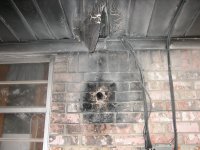Thnx Mace. My familiarity is with the station side of things, so I do appreciate the field feedback and seat of the pants stats.
I have no issue with my insurance company, and wish to keep it that way. I'll run with your gut feel on this, as opposed to calling my insurance company. CTV did a good report a few years back, concerning insurance companies arbitrarily changing, or even cancelling insurance because of a call for information/clarification of coverage - no claim involved.
I agree, risks are higher inside a dwelling. As you are likely aware, those problems span all the way to the actual supply wiring. There is cable coming from "guess where", appearing to have all the certifications stamped on it, but is nothing but a low cost fake.
Rgds, D.
I have no issue with my insurance company, and wish to keep it that way. I'll run with your gut feel on this, as opposed to calling my insurance company. CTV did a good report a few years back, concerning insurance companies arbitrarily changing, or even cancelling insurance because of a call for information/clarification of coverage - no claim involved.
I agree, risks are higher inside a dwelling. As you are likely aware, those problems span all the way to the actual supply wiring. There is cable coming from "guess where", appearing to have all the certifications stamped on it, but is nothing but a low cost fake.
Rgds, D.

